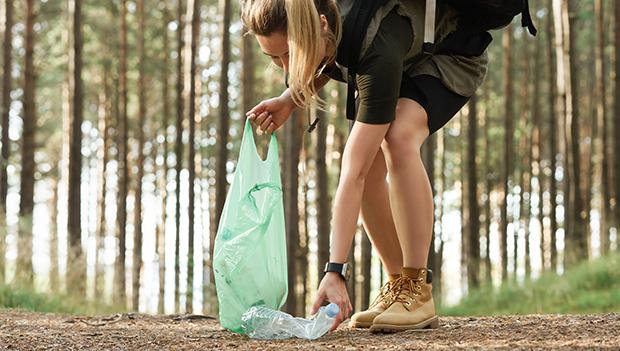
In celebration of Earth Day, we are sharing eight earth-friendly camping habits for a greener outdoor adventure. Even the most eco-conscious consumer in their regular, non-camping life may let sustainable practices slide while camping for the sake of convenience. To ensure you maintain good sustainability habits, while reducing your impact on the natural environment you’re visiting, try to incorporate these earth-friendly camping habits into your next camping trip.
Recommended: Where to Enjoy the Spring Thaw in the Midwest
1. Rent, Borrow, or Repair Gear
It’s tempting to go out and buy outdoor gear in anticipation of an upcoming trip. Rather than purchase a shiny, new item, consider borrowing from a friend or family member. You’ll save money too!
Alternatively, you can rent equipment, or repair an item you own that’s partially broken or looking long in the tooth. The principle behind these alternatives to always just purchasing new is simple. The negative impact of the production of an item is reduced the longer that item is used – so use, use, and use it again.
2. Purchase Eco-Friendly Gear
If you’re in the market for new gear, keep an eye out for sustainable products, such as ones that are BPA-free and made with recycled materials. A wide range of gear – including clothing, backpacks, and sleeping bags – are manufactured with recycled plastics and other goods.
3. DIY Meals and Snacks
Single-use meals and snacks create an enormous amount of waste. Rather than bringing packaged trail mix, energy bars, or pre-made meals, try DIY (do-it-yourself) versions. Buy dry goods in bulk, make energy bars at home, and meal prep as much as as possible in advance. Wrap up your goods in beeswax wraps or reusable silicone storage bags.
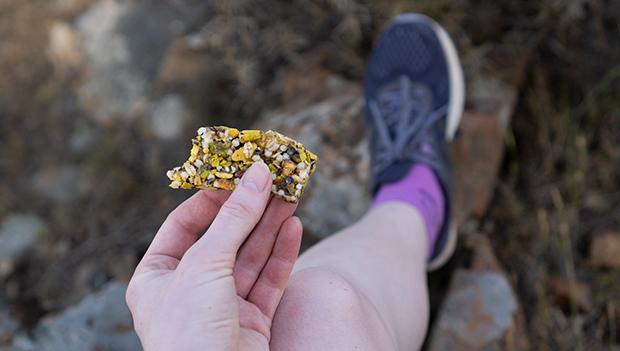
4. Ditch the Plastic Water Bottles
Disposable plastic water bottles are everywhere. We don’t just mean stores, either, but in all sorts of places they shouldn’t be: oceans, woodlands, streams, meadows, parks, and more. With some pre-trip planning, you can avoid relying on the disposable water bottles that clog up our planet (and are not environmentally-friendly to produce in the first place).
Bring along reusable water bottles and bladders for hiking, biking, and other activities. You can also bring a water storage bag or tank for your camp, or rely on campground water. For campground water, or other water sources that are not drinkable, use a filtration and sanitation system. They’re easy-to-use and take up little space.
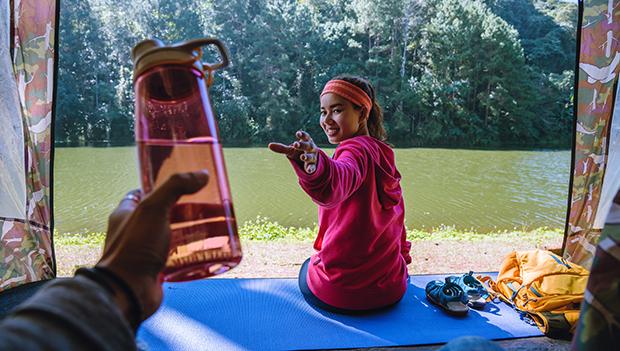
Recommended: Relaxing Beach Camping Destinations
5. Reusable Cookware
Aluminum foil and one-time-use BBQs make clean-up a cinch. The problem is, they’re extremely wasteful. Campgrounds and parks are littered with these items. They spill out of overflowing trash cans on popular camping weekends. The solution is simple: buy a reusable grill and metal cookware for camping. Better yet – reserve a set of pots and pans you no longer use in the kitchen for camping.
6. Reusable Cutlery, Plateware, and Cups
Much like disposable bottles and BBQs, one-and-done silverware, plates, bowls, and cups generate a lot of trash. Instead, bring along reusable versions of these items. Either use what you already have in your kitchen, or purchase a set for camping.
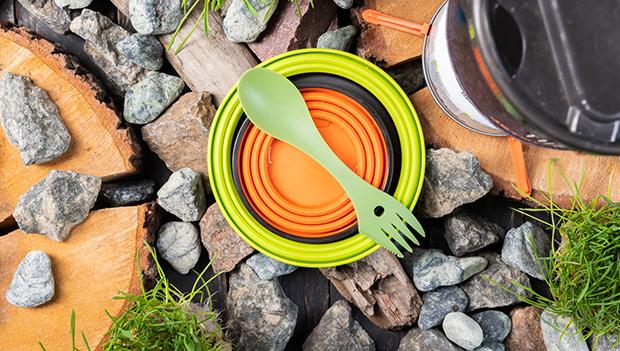
7. Clean Green
When cleaning your reusable cookware, cutlery, plate ware, and cups, reach for a biodegradable dish soap. A lot of dish soaps are damaging to the environment. Consider green shampoo, conditioner, body soaps, and sunscreen, too. Also, never dump wastewater into a body of water or close to one.
Recommended: Spring Camping Trips to Remember
8. Green Energy Supplies
Bring along rechargeable batteries for headlamps, flashlights, and other battery-operated devices. For plug-in gadgets, consider charging with a portable solar charger. Connect your device to the USB output charging port and start charging right away (if the sun is out). If you have a campsite to power, consider using solar panels with a solar generator. Most models are extremely easy to use; simply connect the panel to the generator and ensure the panel is facing the sun.
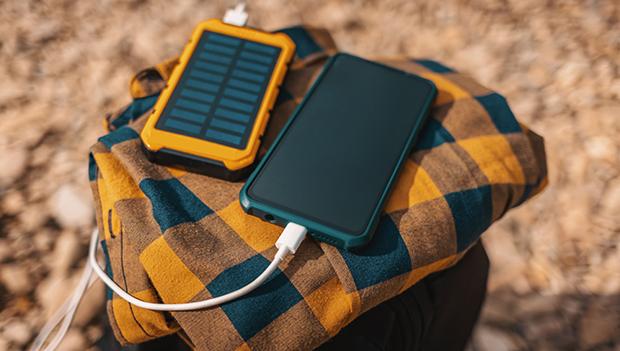
9. Leave No Trace
The “Leave No Trace” motto is composed of several fundamental principles to minimize your impact on the environment and allow you to commune better with nature.
The core tenets of Leave No Trace include
- Traveling through and camping on proper areas
- Disposing properly of waste
- Leaving what you find or see (don’t take items with you)
- Minimizing campfire impacts
- Respecting and staying away from wildlife
- Being considerate of other visitors
Are you ready for your adventure? Plan your camping trip!
Check with your Local Government Organization
Many policies have been established to counter and control the coronavirus outbreak. State and local officials have been taking decisive action to stop the spread. The policies vary by state, sometimes to a great degree. When you book a reservation, make sure to review the park and state’s latest rules and regulations prior to your visit.
For COVID-19 updates, please visit our Impacted Park List and Reservation Guide for the latest information.